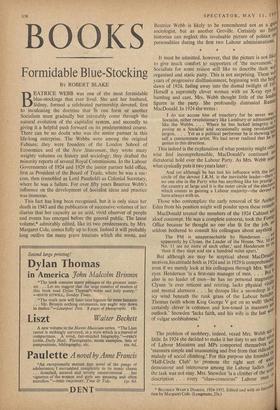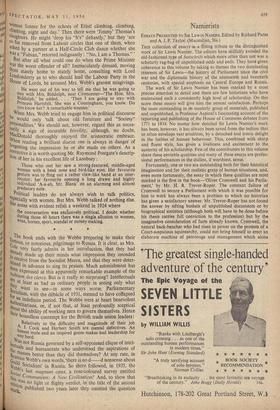BOOKS
Formidable Blue-Stocking
By ROBERT BLAKE BEATRICE WEBB was one of the most formidable blue-stockings that ever lived. She and her husband, Sidney, formed a celebrated partnership devoted, first to inculcating the doctrine that 'in one form or another Socialism must gradually but inevitably come through the natural evolution of the capitalist system, and secondly to giving it ,a helpful push forward on its predetermined course. There can be no doubt, who was the senior partner in this life-long enterprise. The Webbs were among the original Fabians; they were founders of the London Sohool of Economics and of the New Statestnatn, they wrote many weighty volumes on history and sociology; they drafted the minority reports of several Royal Commissions. In the Labour Governments of 1924 and 1929 the junior partner held office, first as President of the Board of Trade, where he was a suc- cess, then (ennobled as Lord Passfield) as Colonial Secretary, where he was a failure. For over fifty years Beatrice Webb's influence on the development of Socialist ideas and practice was immense.
This fact has long been recognised, but it is only since her death in 1943 and the publication of successive volumes of her diaries that her capacity as an acid, vivid observer of people and events has emerged before the general public. The latest volume,* admirably edited, like its two predecessors, by Mrs. Margaret Cole, comes fully up to form. Indeed it will probably long outlive the many grave treatises which she wrote, and Beatrice Webb is likely to be remembered not as a g0 sociologist, but as another Greville. Certainly no AO historian can neglect this invaluable picture of politics ao personalities during the first two Labour administrations• It must be admitted, however, that the picture is not to give much comfort to supporters of 'the movemer Socialists for some reason still like to describe their organised and static party. This is not surprising. These years of progressive disillusionment, beginning with the dawn of 1924. fading away into the dismal twilight of Herself a supremely clever woman with an X-ray e) humbug and cant, Mrs. Webb thought little of the It figures in the party. She profound'y distrusted RI MacDonald. In 1924 she writes : I do not accuse him of treachery for he never vitas Socialist, either revolutionary like Lansbury or adminisi rail!" i° like the Webbs. . . . Where he has lacked integrity is , posing as a Socialist and occasionally using revoluno0r; Jargon. . . . Yet as a political performer he is showing self a consummate artist. We had never realised that he 113' genius in this direction. This indeed is the explanation of what posterity might 006; wise find incomprehensible, MacDonald's continued tiO dictatorial hold over the Labour Party. As Mrs. Webb 101 what cynically puts it two years later : And yet although he has lost his influence with the circle of the devout J.R.M. is the inevitable leader—therc.1, no one else in the Party who has anything like his prestigc lf
the country at large and it is the outer circle of the elector , which counts in gaining a Labour majority—the devour have always with us.
Those who contemplate the early removal of Sir Anti,4 Eden from his position might well ponder upon these rett ar0 MacDonald treated the members of the 1924 Cabinet vil° aloof contempt. He was a complete autocrat, took the Foreign Office because he thought no one else fit for the job, as seldom bothered to consult his colleagues about anything'
The PM is unapproachable by Henderson . .
apparently by Clynes, the Leader of the House. 'No. 11 °/1.
No. 11 see no more of each other,' said Henderson to 'than if they slept and ate a hundred miles apart.'
But although we may be sceptical about MacDorsidi motives, his attitude both in 1924 and in 1929 Is comprehen ibic. even if we merely look at his colleagues through Mrs. W 1/11'' eyes. Henderson 'is a first-rate manager of men. . . . aut h' also is no leader of men—he has no personal magnelisni Clynes 'is over reticent and retiring, lacks physical vi alil) and Mental alertness . . . he droops like a snowdrop 111 `j icy wind beneath the rank ' grass of the Labour bendle' Thomas (with whom King George V got on so well) lth certainly clever is common and low-toned in manners Mltj outlook.' Snowden 'lacks faith, and his wife is the last' o of vulgar snobbishness.'
* * * The problem of snobbery, indeed, vexed Mrs. Webb r°tA little. In 1924 she decided to make it her duty to see that v of Labour Ministers and MPs comported themselves vit° 'manners simple and unassuming and free from that ridicrl°11' malady of social climbing.' For this purpose she founder il 'Half-Circle Club' to promote the right sort of Or s demeanour and intercourse among the Labour ladies. loilt the task was not easy. Mrs. Snowden 'is a climber of the description . . . every "class-conscious" Labour Man * BEATRICE WEB'S DIARIES, 1924-1932. Edited and with an In"( tion by Margaret Cole. (Longmans, 25s,) liken t,' t$: weo' vver'' 1911' e fat adiof ingq wOman listens for the echoes of Ethel climbing, climbing, climbing, night and day.' Then there were 'Jimmy' Thomas's daughters. He might 'drop his "h's" defiantly,' but they 'are so far removed from Labour circles that one of them, when asked by a partner at a Half-Circle Club dance whether she Was a "Fabian," retorted indignantly : "No, 1 am a Thomas." ' LondoBut after all what could one do when the Prime Minister was the worst offender of all? Immaculately dressed, moving nderry stately home to stately home, consulting with Lord tondonderry as to who should lead the Labour Party in the House of Lords, he aroused Mrs. Webb's gravest misgivings.
He went out of his way to tell me that he was going to stay with Mrs. Biddulph, near Cirencester—`The Hon. Mrs. Biddulph,' he added, . . . 'Then I am going to stay with Princess Hartsfelt. She was a Cunningham, you know. Do You know her? A remarkable woman.'
When Mrs. Webb tried to engage him in political discourse he would only 'talk about old furniture and "Society" Personalities.' We should not, however, regard this as neces- srilY a sign of incurable frivolity, although, no doubt, MacDonald thoroughly enjoyed the aristocratic embrace. When reading a brilliant diarist one is always in danger of `°retting the impression he or she made on others. As a corrective it is worth quoting Mr. Raymond Postgate's descrip- t1" of her in his excellent life of Lansbury Those who met her saw a strong-featured, middle-aged woman with a beak nose and bird-like eyes. Her favourite gesture was to fling out a rather claw-like hand at an inter- locutor; her favourite opening a long drawn and highly individual 'A-a-ah, Mr. Blank' on an alarming and almost predatory note.
Political leaders do not always wish to talk politics, vsPecially with women. But Mrs. Webb talked of nothing else. She notes with evident relish a weekend in 1924 where
the conversation was excfusively political. I doubt whether during those 40 hours there was a single allusion to women, wine, horses, sport, scandal or money making.
The book ends with the Webbs preparing to make their c,
famous, or notorious, pilgrimage to Russia. It is clear, as Mrs. already very fairly admits in her introduction, that they had t„ready made up their minds what impression they intended ti'l.receive from the Socialist Mecca, and that they were deter- h,lued in advance to sing its praises. Much astonishment has tr`en expressed at this apparently remarkable example of the are des clercs. But is it really so surprising? Intellectuals they at least as bad as ordinary people in seeing only what sueY want to see—in some ways worse. Parliamentary i,c)cialisna, with the debacle of 1931, seemed to have collapsed ,'"r an indefinite period. The Webbs were at heart benevolent authoritarians, or, if not that, at least profoundly sceptical rout the ability of working men to govern themselves. Hence their boundless contempt for the British trade union leaders :
Relatively to the difficulty and magnitude of their job J. Cook and Herbert Smith are mental defectives. An honest mule and an inspired goose makes bad leadership for
anY herd.
teeWt as not Russia governed by a self-appointed clique of intel- uals and bureaucrats who understood the aspirations of the
Beatrice better than they did themselves? At any rate, in
wild Webb's own words,`there is no d d nonsense about vvelkid Socialism' in Russia. So there followed, in 1935, the Soviet last magnum opus, a rose-coloured survey entitled thi"siet Communism: A New Civilisation? And, to show that ecii,,was no light or flighty verdict, in the title of the second shard "(lo published two years later they omitted the question 4ark.



































 Previous page
Previous page